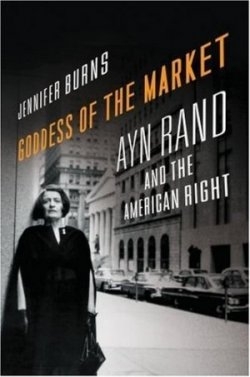BY SAINT JOHN BARNED-SMITH FOR OBIT.COM During her life, Ayn Rand created a shrouded, larger-than-life myth about herself. She credited only Aristotle as an inspiration for her beliefs and insisted that her philosophy, Objectivism – which conceived of man “as a heroic being with his own happiness as the moral purpose of his life, with productive achievement as his noblest activity and reason as his only absolute” – was a wholly original system. (Never mind that she read Nietzsche along with other philosophers and political theorists.) Ayn Rand changed her name (Alisa Rosenbaum) and home. The novelist and philosopher had a flair for the dramatic: She wore a black cape fastened with a dollar-sign brooch. When fans didn’t agree completely with her, Rand developed her own group – a legion of fervent acolytes who claimed as their most basic and fundamental premise that Atlas Shrugged was the greatest book or idea ever conceived. To this day, many rightwingers and libertarians, including Rush Limbaugh, Leonard Peikoff, Dick Armey, Bob Barr and Dana Rohrabacher, cite her as an influence.
Burns, who received unprecedented access to private papers and journals through the Ayn Rand Institute, follows  Rand’s development as a playwright to political junkie to novelist to philosopher to cult icon, though one can’t help but feel a little sorry for her – Burns spent eight years wading through Rand’s effects to write Goddess. At times, her teasing apart the contradictions of her subject’s life and personality resembles the dispassionate dissection of a monster. Take, for example, Rand’s relationship with her character Howard Roark, the pauper protagonist of The Fountainhead who succeeds against all odds because of his ideological purity. Unlike Roark, with whom the author seemed to identify, Rand received all the benefits of an upper middle-class education, mooched off her relatives to set herself up in the United States, and enjoyed the support of a veritable army of influential conservative and libertarian intellectuals and elites who championed her work. And where Roark was pure in his single-minded focus, readers learn of Rand’s unbalanced nature and chronic use of amphetamines. Likewise, although Rand’s characters succeeded in the Objectivist worlds she created for them in Fountainhead and Atlas, in real life, her philosophy fell apart. MORE
Rand’s development as a playwright to political junkie to novelist to philosopher to cult icon, though one can’t help but feel a little sorry for her – Burns spent eight years wading through Rand’s effects to write Goddess. At times, her teasing apart the contradictions of her subject’s life and personality resembles the dispassionate dissection of a monster. Take, for example, Rand’s relationship with her character Howard Roark, the pauper protagonist of The Fountainhead who succeeds against all odds because of his ideological purity. Unlike Roark, with whom the author seemed to identify, Rand received all the benefits of an upper middle-class education, mooched off her relatives to set herself up in the United States, and enjoyed the support of a veritable army of influential conservative and libertarian intellectuals and elites who championed her work. And where Roark was pure in his single-minded focus, readers learn of Rand’s unbalanced nature and chronic use of amphetamines. Likewise, although Rand’s characters succeeded in the Objectivist worlds she created for them in Fountainhead and Atlas, in real life, her philosophy fell apart. MORE

